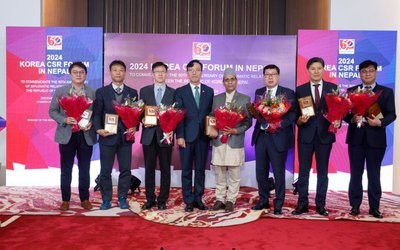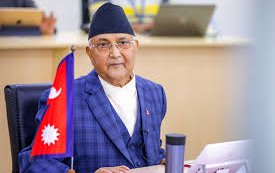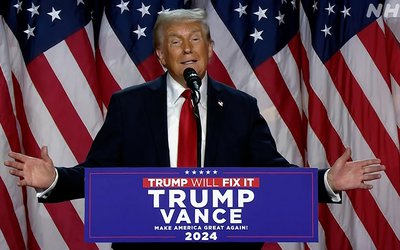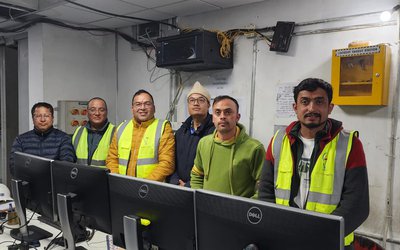When Baburam Bhattarai became Prime Minister some ten months ago, Nepalese were happy that a very honest and popular leader, probably the most admired political leader then, had risen to power. They hoped that Bhattarai would provide economic relief to the poor and bring the long-debated peace and constitution writing work to a happy conclusion. His declaration that he would quit the chair of power if he failed to make significant progress on these fronts (peace and constitution)within forty-five days of assuming power further enhanced people’s respect for him.
A few months down the road, however, people began to give a suspicious look at his activities when he not only backtracked on his loud promise but utterly failed over time to provide even an iota of relief to the people facing double digit inflation and scarcity of necessities such as drinking water, electricity, petroleum products and chemical fertilizers during rice transplanting season. Unceremonious death of the Constituent Assembly (CA), without completion of the task it was charged with, has further discredited the government, declared caretaker by the President soon after the CA dissolution. Political vacuum that has engulfed the nation is blamed on the government and the Maoist Party headed by Prachanda. In addition to this major failure, some other failures of Bhattarai include his inability to bring a full- fledged budget by ordinance for the current fiscal year and declaration of fresh election for a new CA, which he knew he would not be able to hold. It may be mentioned that the Election Commission had given a deadline to the government to amend the Interim Constitution and four electoral acts, which could enable the Commission to hold election slated for November 22. President Ydav, however, has not approved the related ordinances forwarded to him by the government, probably in the face of opposition by the major political parties and the controversy and embarrassment that acceptance of an ordinance on facilities to former bigwigs has created.
It may not be out of place to mention that the Supreme Court stayed the implementation of the July 18 ordinance aimed at providing facilities to not so popular former VIPs and has asked even the President’s office to clarify in writing within 15 days their stance on the ordinance. Almost certain that the President is in no mood to clear these ordinances related to the election, the Commission at a recent press conference has completely ruled out the possibility of holding elections on the stipulated date. The thick-skinned government, however, does not seem to be embarrassed by these failures because it is likely to postpone the CA elections announced for November, which could help prolong its life.
This scribe has been urging since long those at the helm to pay some attention to the state of the economy which is far from satisfactory, but those responsible have done nothing more than blaming their failure to do so on the political impasse. What our politicians should not forget is the fact that there are countries that have achieved considerable progress in keeping the economy growing and reducing poverty even in the midst of internal instability. In our case, however, like Kathmandu’s wretched and disfigured roads where unruly buses and bikes, luxury cars, humans and cattle struggle to move ahead, politics of this country looks jammed. Uncertainty about the next election and growing misunderstanding amongst leaders are pointing towards a more difficult time ahead.
It may be appropriate to mention how some countries have been working to promote bilateral economic relations even in the face of long-existing political tension between them. Appropriate to mention would be the positive developments taking place between India and Pakistan that have decided to increase bilateral trade, which stood at just $2.6 billion last year, a pathetic figure for the two Asian countries with combined economies of over$ 2 trillion. India, with a population of 1.2 billion, has recently opened many sectors of its economy for direct investment by 180 million Pakistanis. Likewise, trade between India and China, two countries sharing tense relationship ancestrally, is likely to surpass $100 billion soon. Problems surface intermittently in every country but the difference between them and us is that problems are fought and resolved there, in our case, however, we tend to be away from them under one pretext or the other, in most cases blaming somebody else for the mess. With Greece, Spain, Portugal, Ireland, etc getting into serious economic trouble one after another, it seems the EU is already in a state of recession. Alarming is the current state of Greece whose debt is likely to reach 160 percent of its GDP and where thousands of unemployed people are furiously protesting on the streets of Athens their government’s austerity measures. Major burden of rescuing the ailing economies of EU lies on the shoulder of Germany, largest economy in EU, which is expected to live with little higher inflation, consume more and prop up the weaker members of the currency union. EU also expects China and India to help them fight the ailment, and keeping the region in an ailing state would not be in the interest of the two strong Asian economies whose exports to EU stand at about 18 and 20 percent of their total exports, respectively. Euro Zone is expected to grow by only 0.3 percent in 2012 and no country or region can remain immune from this European debacle in the present inter-connected global economy. The lesson we can learn from Europe is that their tireless efforts to combat and contain problems are praise worthy and economic reforms can be pushed ahead even in the midst of chaotic political situation. Note worthy also is the effort of Eastern European countries to attain higher level of growth to ensure better quality of life for their people. Mention worthy is the progress made by war-devastated Poland, which attained a growth rate of up to 4 percent in recent years. With a strong public transportation system, very well performing service sector and manufacturing and agriculture offering vast potential for further improvement, one would not be surprised to see Poland, which adopted a policy of economic liberalization throughout the 1990s, as a major European economic power in not too distant a future. Poles are working closely with their former foes to help develop their economy fast and have very wisely decided to take some more time to join the currency union.
Lessons are in abundance for us to learn but learners are in scarcity in Nepal where corruption has attained new heights, and some of its leaders are seemingly engaged in destroying communal and racial harmony that so happily existed in this country created by late King Prithvi Narayan Shah some 240 years ago.Bhattarai failed as did his predecessors and will take an exit making place for someone in the queue ,but the important thing to be noted is whatever the make-up of the next government,no substantive change affecting people’s life is expected, leaders and their quality remaining constant.
- SWISS SUPPORT: Construction Of A Trekking Trail In Koshi
- Dec 19, 2024
- PM OLI'S VISIT TO CHINA: BRI Agreement
- Dec 16, 2024
- RASUWAGADHI AND SANJEN: Begin Generation
- Dec 03, 2024
- NEPAL, INDIA ELECTRICITY TRADE Nepal's Advantage
- Dec 02, 2024
- PM Oli'S VISIT TO CHINA: Nepal's Dilemma
- Dec 01, 2024














